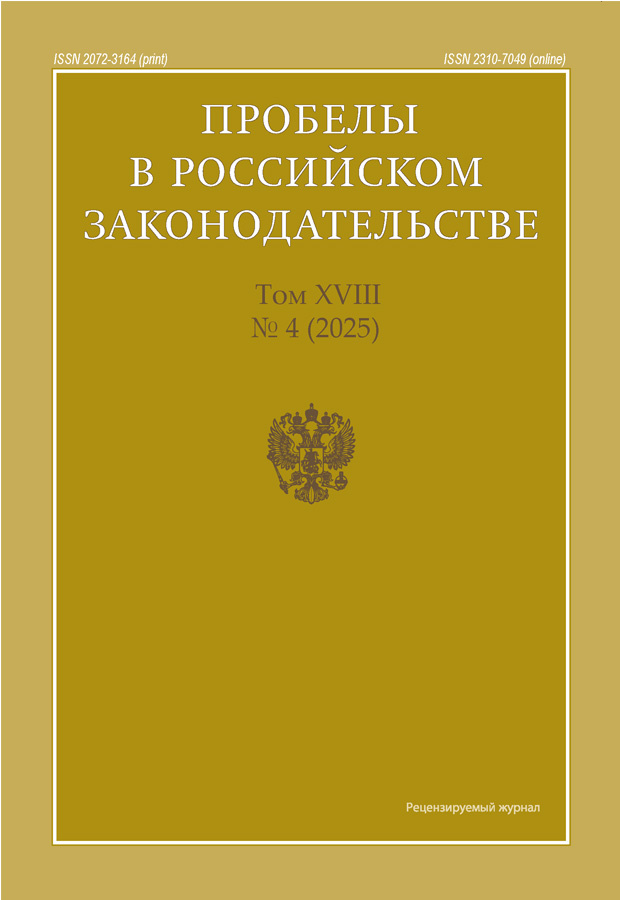Application of digital technologies (artificial intelligence) in the activities of law enforcement agencies
- Authors: Baslueva N.N.1
-
Affiliations:
- Moscow Regional Branch of the Moscow University of the Ministry of Internal Affairs of Russia named after V.Ya. Kikot
- Issue: Vol 18, No 4 (2025)
- Pages: 127-132
- Section: Criminal Law Sciences
- URL: https://journals.eco-vector.com/2072-3164/article/view/689455
- DOI: https://doi.org/10.33693/2072-3164-2025-18-4-127-132
- EDN: https://elibrary.ru/BWQXNQ
- ID: 689455
Cite item
Abstract
The subject of this article is the state and dynamics of existing threats to information security, factors influencing their formation, methods of countering used in domestic and foreign practice, and systems of national and foreign legislation that form the basis for countering these threats. The relevance of the research topic is ensured by the fact that the fourth scientific and technological revolution is currently taking place, which is characterized by the development of information and telecommunication technologies. Robotics is developing, global cyberspace is being created, in a word, global computerization of human life is taking place. The purpose of the article is to study the problematic aspects of the national system and systems of foreign countries to ensure the security of individuals, society and the state in the context of global digitalization, and to make proposals to improve the functioning of the above–mentioned systems. The conclusion of the article is devoted to the need for active development and implementation of new ways and methods of ensuring international information security.
Full Text
About the authors
Natalia N. Baslueva
Moscow Regional Branch of the Moscow University of the Ministry of Internal Affairs of Russia named after V.Ya. Kikot
Author for correspondence.
Email: bashlueva@mail.ru
SPIN-code: 1147-2621
Cand. Sci. (Ped.), Assoc. Prof., Associate Professor of the Department of Socio-Economic and Humanitarian Disciplines
Russian Federation, MoscowReferences
- Federal Law No. 187-FZ dated July 26, 2017 "On the Security of the Critical Information Infrastructure of the Russian Federation" [Electronic resource Access mode: http://www.consultant.ru/document/cons_doc_LAW_221756 / (date of access: 05.05.2025).
- Decree of the President of the Russian Federation dated 05.12.2016 No. 646 "on approval of the Doctrine of Information Security of the Russian Federation" [Electronic resource Access mode: http://publication.pravo.gov.ru/Document/View/0001201612060002 (date of request: 05.05.2025).
- Decree of the Government of the Russian Federation dated 08/19/2020 No. 2129-r "On approval of the Concept for the Development of Regulation of relations in the field of artificial intelligence and robotics technologies until 2024" [Electronic resource Access mode: https://www.garant.ru/products/ipo/prime/doc/74460628 / (date of access: 05.05.2025).
- Devyatkova V.V. Artificial intelligence systems / ch. ed. N. B.N. Fedorova, Moscow: Publishing House of the Bauman Moscow State Technical University, 2001. 352 p.
- Meredith Br. Artificial intelligence. The limits of the possible. Moscow: Alpina non-fiction, 2020. 456 p.
- Khismatullina Yu.R., Ilyina V.V.. Artificial intelligence in the police. Proceedings of the III All-Russian scientific and practical conference "Topical issues of law, economics and management". Ulyanovsk: UlGPU, 2021. Pp. 255–257.
- Gavrilov V.A. Personal safety of law enforcement officers in various conditions of service and combat activity: textbook.- practice. stipend. Kazan: KUI of the Ministry of Internal Affairs of Russia, 2018. 83 p.
- Sedova E.V. The legal basis for the protection of police officers from criminal encroachments. Bulletin of Science. 2024. No. 11 (80). Pp. 601–607. URL: https://cyberleninka.ru/article/n/pravovaya-osnova-zaschity-sotrudnikov-organov-vnutrennih-del-ot-prestupnyh-posyagatelstv (date of request: 05.05.2025). (in Rus.).
Supplementary files









